Lightness
in Air
In the sunshine above the clouds
and at the mercy of the Atlantic
![]()
|
Lightness
in Air |
|
by Andrea Tremolada
|
This article appeared in the June/September 2000 issue of the Falco Builders Letter. |
|
On June 26, Andrea Tremolada left Biella, Italy for Seville, Spain and the first leg of his flight across the Atlantic. The next leg was from Seville to Sal Island, Capo Verde, off the coast of Senegal in West Africa. With full fuel, the Falco was very difficult to fly for the first two hours, but flight conditions were good with no wind and a hazy sky. In all, it took 12 hours and 5 minutes, and Andrea landed tired and happy. And on Monday, July 3, while America tanned at the beach and shopped for fireworks, Andrea Tremolada took off from Sal Island for the longest and most harrowing flight of his life. Here is Andrea's account, and we join him at Sal Island. Alfred Scott |
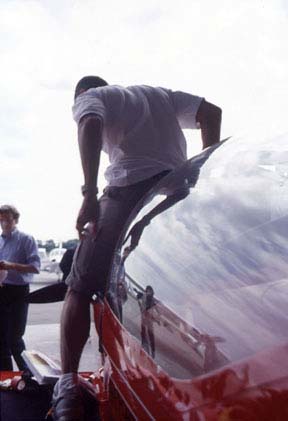
Climbing aboard in Biella, Italy
A week after departure from Biella, the international airport of Amilcar Cabral is the last outpost before the great stretch of ocean. It's five in the morning, and this time there are no friends gathered to see me off.
I sort out the last bits of red tape, fill the tanks and drop by the desk at the meteorological office. The charts show a disturbance arriving from Africa: I'm hoping to outrun it. Out on the vastness of the apron, under the leaden sky, the Falco seems to be even smaller than it really is.
I wonder just how small I am, too. How small is a man compared to an international runway? Compared to the incredible breadth of the ocean? And how great is the strength generated by the desire to achieve, to fulfil a dream?
Great enough, in my case, to take a bull-headed run at the problems I'd met so far. Great enough to overcome the resistance of all those who insisted that I'd fall asleep after 12 hours of uninterrupted flying.
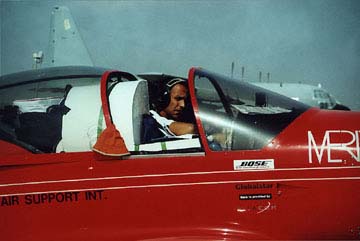
Andrea preparing to leave Seville, Spain
I slowly do up my seat-belt. Before I take off, I remain silent, listening attentively. What if I were biting off more than I could chew? What problems might I run up against during the flight? Little by little the sky begins to brighten with the first light of dawn. Drops of rain are falling, soaking the cockpit, the flight charts and my hair. I insert the ignition key, the propeller turns over three times and the engine comes to life. The fuselage shakes and the maps flutter about crazily.
We're off. My hands hurry to key in the frequencies, regulate the altimeter, set the engine. My brain switches to autopilot, there's no room for emotions -- I'm straining to pick up any unusual sound. Everything's working perfectly, every-thing's normal. The plane shudders, the brakes can no longer hold it back -- it wants to be free, ready for the transatlantic leap. I'm worried, though. I watch the sky. I cross myself and touch the Madonna di Loreto key-ring, a gift from the priest who had blessed the plane on Friday before the start of the journey.
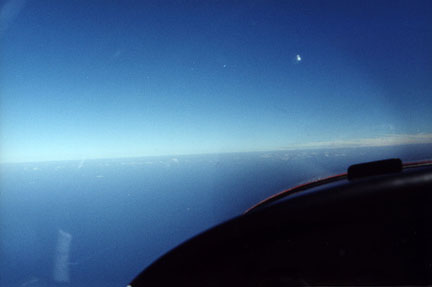
Crossing the Atlantic. Good weather at first.
As I pick up speed, the wings begin to take the weight off the undercarriage. As usual, my little plane flies badly at first, but she's more at home in the sky than on the ground. After about three minutes I make a slow turn to port, as the first wisps of vapour begin to caress the fuselage. A couple more seconds and I'm wrapped in the darkness of the cloud.
As I break out into the sunlight at 4,000 feet about fifteen minutes later, I recall what I used to say when, during the grey days of a Milan winter, my friends would complain of the rain. I reminded them that above the clouds there was bright sunlight. Always, despite the gloom. But isn't life like that, too? There are times when everything seems to fall on your shoulders, and others when we smile and seem to be walking in the sunlight, overcoming with ease all the obstacles that life puts in our path every day.
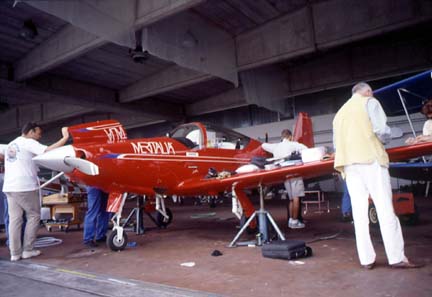
Preparing the Falco in Italy.
It is some time since the sea has been visible. Here, 500 miles after takeoff the weather I had seen on the charts announces itself. The plane trembles and shakes. The warmth of the cockpit is all I have to reassure me. I take off the headphones and listen to the terrifying noise. The plane's wooden framework transmits every vibration, amplifies it like a sound chamber. I check my position on the maps. I run up against the first problems at 9:14, 504 miles from takeoff. That's about when I enter the turbulence and begin to be tossed about. I've already banged my head several times against the canopy, and I've been hit many times by objects lying around the cabin. At 9:23, I enter a weather cell bigger than the others.
Darkness envelopes the plane without warning and my speed drops rapidly. The hailstones are battering the fuselage. The GPS box hurtles towards me. I try to avoid it, but it hits me under the eye. I'm flying upside down. I only manage to work this out by looking at the Madonna on the key ring, no longer hanging towards my legs, but swinging head-down towards the instrument panel rim. Instinctively my left hand reaches out to touch it and beg for help. First of all I have to right the plane and re-establish the correct flight attitude.
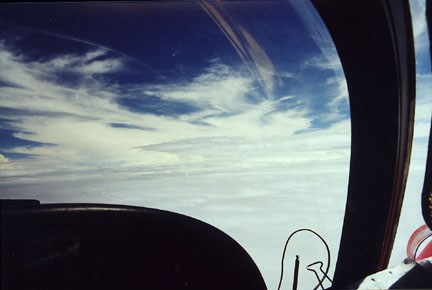
I remember that it's clearer to starboard, so I make a 270 degree turn. Nothing, just more heavy water. But a few minutes later I re-emerge into clear skies, and I glance at the altimeter: I'm at 15,000 feet. I have a moment to pull myself together. A torrent of water has flowed in through the instrument panel, my shirt is soaked through, my trousers, hair and maps, too. All the breakers have tripped, there must be a short somewhere, and the best thing to do is wait. My father always used to tell me that planes are the fastest means of transport for people who aren't in a hurry. And I shouldn't try to hurry things. I could turn back, stand once again on the Sal Island apron and wait for conditions to improve.
But the Atlantic is still the Atlantic, and the subtropical front is still in the same place. I'd have to get through it whatever happened, so I might as well do it now. I reset the normal cruising conditions. I have to keep turning to avoid the blackest cells. I climb again.
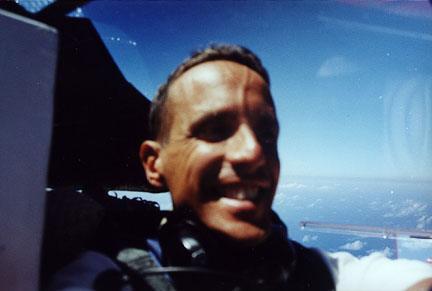
Ignorance of weather ahead is bliss!
At last, 150 miles on, I suddenly break out into blue skies. I cry tears of happiness. It's the first time since the flight began that I can see sea and sky at the same time. I hope that's it's really over, I grab my camera and take a few photos. I take a pee and have a bite to eat. I scan the sea, looking for a ship, but there are none to be seen.
I've been flying for seven hours.
I feel I belong more to the air than the earth. I'm part of infinite space, part of something bigger than anything I'd experienced so far. I feel light, and want to continue this flight without limits. I'm a dot on the ocean, but I exist. I'm moving at 150 knots, riding a dream unfolding moment by moment, slowly being burnt up like the fuel in the tank. I'd like to rewind time, relive every minute, even the journey through the storm -- yes, even these moments play their part in the magical adventure. What makes us so happy when we live through something so magnificent? The uncertainty of what awaits us afterwards, or the desire to satisfy the perennial desire that pushes mankind forward?
Another disturbance sets in 450 miles from the Brazilian coast. I prepare once again for the airborne dance. Little by little the sky darkens. The turbulence gets worse, the rain becomes heavier. I turn 15 degrees to starboard, where I think I can see some chinks in the cloud.
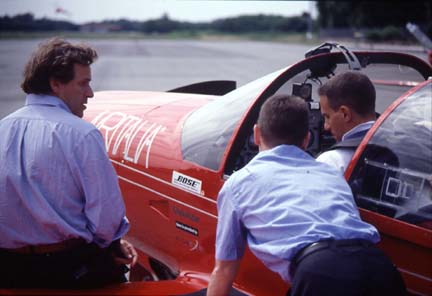
My trousers are soaking wet: water is pouring in through the lateral intakes, sloshing over the fuel tank and ending up all over my legs. I feel like I'm standing in a car wash, but I don't find it funny.
I'd like a weather bulletin from Recife, but I can't get through to anyone on the radio. How far to Brazil? If all goes well, three and a half hours. No, it must be more. I can't follow a straight line, my course is made up of detours of fifteen or twenty miles to port or starboard to dodge the most threatening downpours.
My survival equipment includes a life jacket and a dinghy, but I'm not too sure how useful this will be, even if I manage to survive the impact of the plane as it hits the water. I'd have to unfasten my safety belt and throw that life raft into the water -- I can't even stretch out my legs on it. They'd be dangling in the water, and in the cold of the night I don't think I would be able to survive.
Nature rebels with all its strength. The floor is awash. Here the raindrops aren't drops, they're pebbles. I'm cold, but the heating isn't working because I've had to close the outside air intake. It's dark now, and what little light there is in the cockpit comes from the glow of the two GPS units, greenish and reassuring.
I'm only 40 miles from the coast. I try to find Recife on the map in the flashlight's glare. I'm still too low, I must climb to 2,000 feet, the minimum height to intercept radio signals.
I thought things were bad at 400 feet, but at 2,000 it's an inferno. Bolts of lightning illuminate the sky as if it were day.
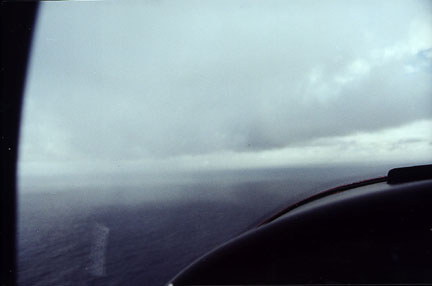
At last the control tower picks up my signal. I haven't spoken to anyone for 12 hours. One or two minutes and I identify myself, get instructions to continue. But the undercarriage doesn't respond -- I have to lower it manually. I must watch out, to make a careless mistake now would really be a sick joke.
I look up, hoping to catch sight of lights. Still nothing. Then a freeway, then a little further on, the runway. We've made it. Brazil is passing below the belly of the plane.
I'm on land. I open the canopy and stretch out my arms. So what if it's pouring with rain, I want to have contact with the earth once again. I taxi to my parking spot, the man in front of me crosses his arms. This is the signal to turn off the engine. No, please, just one moment more. Under my belt now are 13 years of work, 13 hours and 43 minutes of flying.
In Milan, people are coming out of the cinema or going to a club. In Brazil, a little airplane and her pilot complete the final few operations before finishing the long flight over the Atlantic. A crowd of inquisitive onlookers and photographers gather round my Falco. It takes me two tries to get out of my seat. I get down with difficulty. At last I'm touching the ground. The asphalt is soaking wet but pleasant on this cloudy evening.
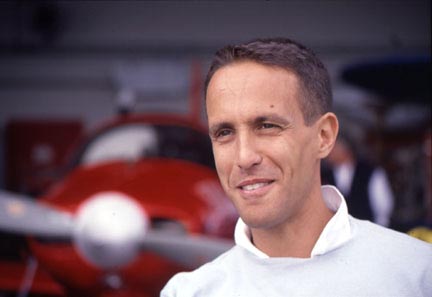
|
|